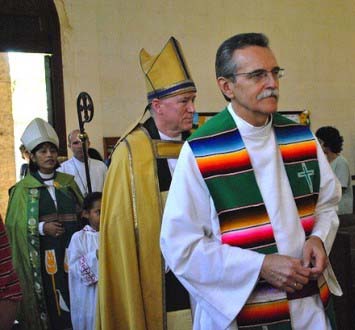The Rev. Gertrude (Trudy) Lebans has quit her position as rector of the Parish of St Laurence, Coquitlam; she is retiring. Rev. Trudy climbed the ecclesiastical ladder (or, depending on one’s perspective, slid down the episcopal snake) from the second most liberal diocese in Canada – Niagara – to the most liberal diocese – New Westminster – about eight years ago.
As is only right and proper for a model of liberalism, the Parish of St Laurence has a colourful Integrity logo, a quote from Solomon Ibn Gabirol (although the name is misspelt) and a promise of justice, peace and positive social change.
Rev. Trudy believes that the Resurrection, rather than being anything as crass as an event, let alone historical or, perish the thought, physical, is really a process, an unfolding, a wafting as we ride the wings of the spirit.
Another clarifying point for us is that resurrection is not an event so much as a process, an unfolding experience in which we become more secure riding the wings of the spirit…… Happy Resurrection!
After the struggle, after the doubts and fear that things will never be all right, comes the promise. And we will hear the music and we will feel the wind on our cheeks and one more time we will rise in freedom and joy.
I wish Rev. Trudy all the best on her escape from both the Diocese of Niagara and New Westminster: no wonder she hears music and feels wind on her cheeks.
Incidentally, there is nothing that trivialises an event of cosmic significance quite so effectively as preceding it with “Happy”. Even though they prove my point, I have accommodated to “Happy Easter” and “Happy Christmas; but never, “Happy Resurrection”. “Happy Armageddon” has a pleasant ring to it, though.


 In Bangladesh, at least, where fanatical Islamists are demanding the arrest of atheist bloggers.
In Bangladesh, at least, where fanatical Islamists are demanding the arrest of atheist bloggers. There is a knack in doing
There is a knack in doing  The Diocese of Uruguay is a liberal diocese in a conservative province, a misalignment of predispositions that prompted it to ask to be moved to a more simpatico province;
The Diocese of Uruguay is a liberal diocese in a conservative province, a misalignment of predispositions that prompted it to ask to be moved to a more simpatico province;